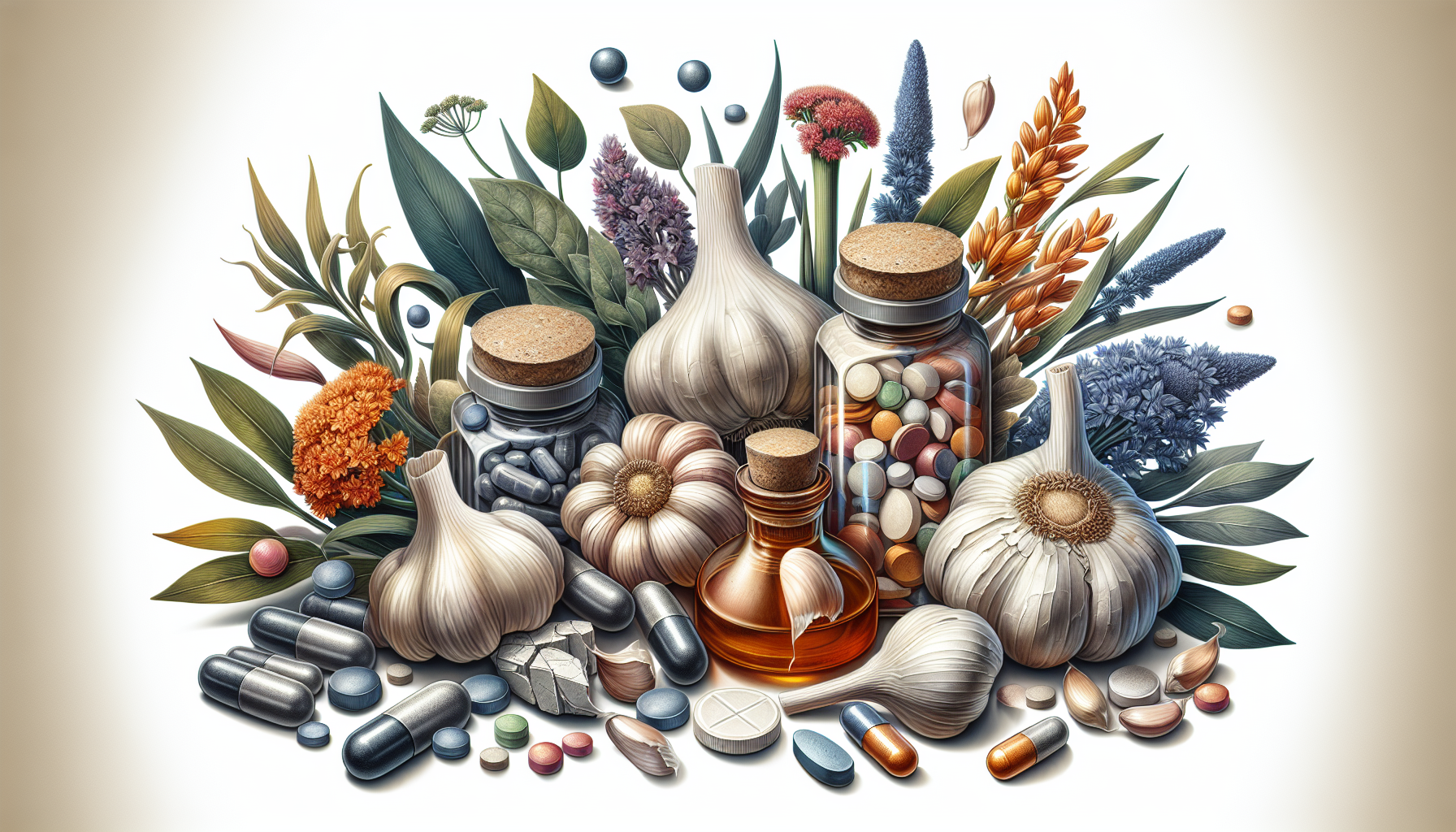Dealing with high blood pressure can be daunting, but there are effective ways to manage it, including lifestyle changes and dietary supplements. This article explores the best supplement for high blood pressure, focusing on nutrients like omega-3 fatty acids, magnesium, CoQ10, potassium, and garlic. These supplements have shown potential in helping to lower blood pressure naturally and maintain healthy blood pressure levels, making them valuable additions to your wellness routine.
High blood pressure, or hypertension, is a common condition that can lead to serious health issues such as heart disease and kidney disease if left unmanaged. While traditional treatments and prescription medications are essential, certain dietary supplements can provide additional support. However, it's crucial to remember that these supplements should complement, not replace, your current treatments and lifestyle changes. Before adding any new supplement to your regimen, especially if you're already taking medication, consult a healthcare professional to ensure safety and effectiveness. Understanding the right supplements and their roles in managing blood pressure can help you make informed decisions for your health.
Key Takeaways
- High blood pressure, or hypertension, affects a significant portion of the aging population and requires effective management to prevent serious health issues.
- While supplements like omega-3 fatty acids, magnesium, CoQ10, potassium, and garlic can aid in blood pressure management, they should complement, not replace, traditional treatments and lifestyle changes.
- Consulting with a healthcare provider before starting supplements is crucial to ensure safety and effectiveness, especially when combined with existing medications.
Understanding High Blood Pressure

High blood pressure, also known as hypertension, is a condition where the force of the blood against the artery walls is too high, leading to serious health problems over time. The American Heart Association states normal blood pressure is below 120/80 mm Hg. As we age, the risk of developing high blood pressure increases significantly, with two-thirds of those in their 60s affected.
Hypertension is often called a ‘silent killer’ because it typically has no symptoms until significant damage has occurred. This condition can weaken blood vessels, leading to long-term damage to organs such as the heart, kidneys, and brain. This damage increases the likelihood of heart disease, heart attacks, and strokes. Maintaining normal blood pressure is crucial for ensuring adequate blood flow to vital organs and promoting overall health.
Recognizing the seriousness of high blood pressure underscores the need for effective management. Blood pressure medication is often essential, but lifestyle changes and natural interventions, such as supplements, can also significantly reduce blood pressure and lower the risk of severe health issues.
Are Supplements Effective for Managing Blood Pressure?

The effectiveness of supplements in managing high blood pressure is a topic of much debate. While dietary supplements can help lower blood pressure, they should not replace conventional treatments and should be considered complementary. Many nutraceutical companies conduct extensive clinical research on these supplements, often collaborating with reputable clinics like the Mayo Clinic. However, it's important to note that most studies examining these supplements are of low quality or involve small sample sizes, making it challenging to draw definitive conclusions.
Doctors typically do not routinely recommend supplements as a primary method for managing hypertension. However, increasing magnesium intake by 100 mg daily has been associated with a 5% reduction in the risk of developing high blood pressure. Although vitamin D supplementation hasn’t shown significant effectiveness in lowering blood pressure levels, green tea has been linked to reductions in blood pressure. However, more extensive long-term studies are needed.
It’s crucial to consult with a healthcare provider before starting any supplement to ensure it’s safe and appropriate for your health conditions. A comprehensive approach that includes a healthy diet, regular exercise, and stress management, along with the right supplements, can be beneficial for managing blood pressure effectively.
Top Supplements to Help Lower Blood Pressure

Supplements can play a significant role in managing high blood pressure by contributing to better heart health. While they should not replace prescription medications, certain supplements can help lower blood pressure naturally. This section will explore some of the best supplements to manage blood pressure, including omega-3 fatty acids, magnesium, CoQ10, potassium, and garlic.
These supplements have unique properties that can support cardiovascular health and help maintain healthy blood pressure levels. From enhancing vascular health to promoting relaxation of blood vessels, these natural remedies can be valuable additions to your blood pressure management plan.
Here are the specifics of each supplement and their benefits.
Omega-3 Fatty Acids
Omega-3 fatty acids are well-known for their heart health benefits, including their ability to reduce blood pressure. Regular intake of omega-3s, found in fish oil and flaxseeds, has been shown to lower systolic and diastolic blood pressure. Studies suggest that about 3 grams of omega-3 fatty acids daily is optimal for blood pressure reduction.
These fatty acids help lower blood pressure and improve overall heart function, making them a valuable addition to dietary supplements. Including omega-3-rich foods in your diet or taking high-quality supplements can provide significant cardiovascular benefits.
While fatty fish like salmon and mackerel are excellent dietary sources of omega-3s, there are also great plant-based alternatives available for those following a vegan or vegetarian diet. Flax and chia seeds are popular options, though it's important to note that the body must convert these plant-based omega-3s into the active forms found in fish oil, which may result in lower bioavailability.
We recommend exploring high-quality omega-3 supplements derived from algae for our vegan and vegetarian readers. These supplements provide the same form of omega-3 fatty acid as fish oil, offering a more direct and effective option without needing conversion in the body. For more information, check out our article, "From Algae to Awesomeness: Five of The Best Vegan Omega-3 Supplements You Need to Know," highlighting top vegan omega-3 products that ensure optimal health benefits.
Magnesium
Magnesium, an essential mineral, plays a vital role in blood pressure regulation. Higher magnesium intake can significantly reduce blood pressure by improving vascular health. Studies have shown that every 100 mg increase in dietary magnesium is linked to a 5% reduction in blood pressure risk.
Magnesium supplements are particularly effective when combined with a reduced salt intake, as they help relax blood vessels and improve blood flow. Incorporating magnesium-rich foods like leafy greens, nuts, and seeds into your diet or taking supplements can effectively help manage blood pressure.
For those interested in further exploring the benefits of magnesium, we recommend checking out our article, “Magnesium Marvels: Discover the Five Best Magnesium Bisglycinate Chelate Supplements for Your Wellbeing.” This article highlights five of the top magnesium complex products on the market, all sourced from premier nutraceutical companies. It's an excellent resource for anyone looking to understand the different forms of magnesium supplements and find the best options to support their health.
Coenzyme Q10 (CoQ10)
Coenzyme Q10, or CoQ10, is a powerful antioxidant that has shown potential in decreasing systolic blood pressure. Supplementation with CoQ10 can lower systolic blood pressure readings, contributing to better heart health.
By reducing blood pressure, CoQ10 helps alleviate the strain on the heart and improves overall cardiovascular function. Adding CoQ10 supplements to your routine can be a beneficial step toward maintaining healthy blood pressure levels.
For readers interested in a more in-depth look at Coenzyme Q10, we recommend our article, “From Heart Health to Energy Boost: Finding the Best CoQ10 Supplement for You.” This comprehensive guide explores five of the top CoQ10 supplements available, offering insights into their benefits for maintaining healthy blood pressure and supporting overall cardiovascular health. Here, we highlight the best options to help you choose the right supplement, ensuring you get the most out of this powerful antioxidant.
Potassium
Potassium is vital for maintaining balanced blood pressure and overall cardiovascular well-being. Increased potassium intake promotes blood vessel relaxation, aiding blood pressure regulation. It also helps mitigate the effects of sodium on blood pressure, making it an essential nutrient for heart health.
Eating potassium-rich foods such as bananas, potatoes, and spinach or taking supplements can help manage blood pressure. Adequate potassium intake is essential for proper heart function and maintaining healthy blood pressure levels.
Garlic
Known for its medicinal properties, garlic can significantly lower both systolic and diastolic blood pressure in individuals with hypertension, according to research. A typical dosage of garlic supplements ranges from 600 to 1,200 mg per day for effective results.
While garlic supplements are generally safe, they may cause digestive upset or allergic reactions in some people. Including garlic in your diet or taking supplements can be a natural way to help lower blood pressure and reduce the risk of cardiovascular disease.
Additional Supplements Worth Considering

In addition to the well-known supplements discussed earlier, several lesser-known supplements may aid blood pressure management. While these supplements may not be as widely recognized, they can contribute to overall cardiovascular health and help manage blood pressure effectively.
Melatonin has shown potential in lowering blood pressure, especially in individuals with high levels. High-dose ginger supplements may also help reduce high blood pressure, offering natural remedy options. These additional supplements can be valuable tools for managing blood pressure.
Vitamin D
While primarily known for bone health, vitamin D may also reduce the risk of high blood pressure. Higher vitamin D levels are associated with better blood pressure control, making it a beneficial supplement.
Checking your vitamin D levels and supplementing accordingly can be a proactive step in managing rising blood pressure.
Vitamin C
Vitamin C is crucial in maintaining healthy blood pressure levels through its antioxidant properties. Several research studies have shown that vitamin C supplementation can significantly reduce systolic and diastolic blood pressure.
Increasing vitamin C intake through supplements or diet can benefit individuals looking to manage their blood pressure effectively.
Green Tea
Green tea is rich in antioxidants and bioactive compounds that can help reduce high blood pressure. Regular consumption of green tea has been linked to significant reductions in both systolic and diastolic blood pressure levels. The polyphenols in green tea, chiefly catechins, help improve blood vessel function and promote relaxation, contributing to lower blood pressure.
In addition to its blood pressure-lowering benefits, green tea is associated with improved cholesterol levels, heart health, and weight management. To gain these benefits, consuming 3-5 cups of green tea daily is generally recommended, depending on individual tolerance and preferences.
When to Talk to Your Healthcare Provider
Before taking any supplements for blood pressure, consulting a healthcare professional ensures safety and effectiveness. Some supplements can worsen health conditions, so discussing them with your provider helps mitigate risks. Healthcare professionals can guide patients on which supplements are safe to use alongside prescription medications.
Tracking blood pressure at home and having regular checkups with a healthcare provider is essential for effective management. This helps ensure that the supplements and lifestyle changes you’re implementing have the desired effect and allow adjustments as needed.
Lifestyle Changes to Support Healthy Blood Pressure

Lifestyle changes are vital in managing high blood pressure alongside supplements. A diet rich in fruits, vegetables, and whole grains but low in saturated fats can reduce blood pressure by up to 11 mm Hg. Reducing sodium intake to less than 2,300 mg daily can lower blood pressure by 5 to 6 mm Hg.
Regular exercise is another powerful tool, with at least 30 minutes of moderate aerobic exercise daily lowering blood pressure by 5 to 8 mm Hg. Weight management is also essential, as a reduction of 1 kg in weight can lead to a 1 mm Hg decrease in blood pressure. Quitting smoking, managing stress, and getting adequate sleep are additional lifestyle changes that can support healthy blood pressure levels and are effective in regulating blood pressure.
Combining these lifestyle modifications with dietary supplements can enhance cardiovascular health and lower blood pressure. By making these changes, you can take control of your health and reduce the risk of hypertension-related complications.
Summarizing Our Discussion on High Blood Pressure
Managing high blood pressure requires a holistic approach, combining conventional treatments, lifestyle changes, and dietary supplements. Supplements like omega-3 fatty acids, magnesium, CoQ10, potassium, and garlic have shown significant potential in helping to lower blood pressure and support heart health. Additionally, incorporating vitamin D, vitamin C, and green tea into your routine can further aid in achieving healthy blood pressure levels. These nutritional supplements work in synergy with lifestyle modifications such as a balanced diet, regular exercise, and reduced sodium intake, contributing to better cardiovascular health and overall well-being.
For those interested in exploring the best supplement for high blood pressure, our linked articles provide more in-depth information on choosing the right products, including specific recommendations and detailed benefits. Remember, while supplements can be crucial in managing blood pressure, they should be used alongside, not as a replacement for, traditional blood pressure medication and medical advice. Always consult a healthcare professional before starting any new supplement regimen to ensure safety and effectiveness. By taking a proactive and informed approach, you can effectively manage blood pressure naturally and reduce the risk of serious complications.
To Wrap Up, Here are Answers to FAQs
Are supplements safe to use for managing high blood pressure?
Supplements can be beneficial for managing high blood pressure, but it's essential to consult your healthcare provider before starting any new regimen to ensure safety and effectiveness. Prioritizing professional guidance will help avoid potential interactions with medications or health conditions.
How long does it take for supplements to lower blood pressure?
Supplements can begin to lower blood pressure in a few weeks, but the timeline varies by individual and the specific supplement used. Monitoring your progress and consulting a healthcare professional for tailored advice is essential.
Can I take supplements instead of my blood pressure medication?
Supplements should not replace your blood pressure medication, as they are meant to complement, not substitute, conventional treatments. Always consult your healthcare provider before making any changes to your medication plan.
Are there any side effects associated with taking blood pressure supplements?
Blood pressure supplements can have side effects, such as digestive upset or allergic reactions, and may interact with other medications. It is crucial to consult your healthcare provider about these potential risks.
What lifestyle changes can help support healthy blood pressure levels?
To support healthy blood pressure levels, adopt a nutritious diet, limit sodium intake, exercise regularly, manage stress, quit smoking, and ensure adequate sleep. These lifestyle modifications are crucial for maintaining optimal blood pressure.
Thanks for taking this journey to explore the best supplement for high blood pressure. If you want to add to your library of knowledge and are interested in exploring some of the supplements mentioned in this article, you should check out the links above. It could be a huge time-saver—you won't be sorry you took a look.
Also, please return soon to check out our next review of other incredible supplements – we’re always looking out for YOU!
*We are NOT qualified medical advisors. The content here is only based on our personal opinions and research and should NOT be used as a substitute for a healthcare professional's advice!











Member discussion